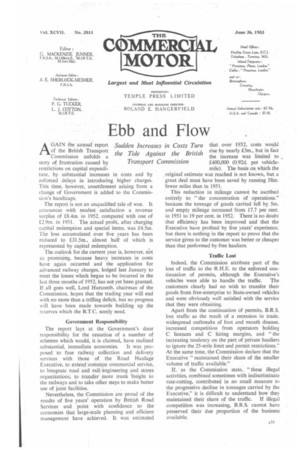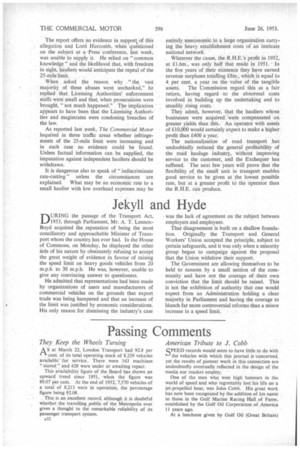Ebb and Flow
Page 33

Page 34

If you've noticed an error in this article please click here to report it so we can fix it.
AGAIN the annual report of the British Transport Commission unfolds a story of frustration caused by restrictions on capital expenditure, by substantial increases in costs and by enforced delays in introducing higher charges. This time, however, unsettlement arising from a change of Government is added to the Commission's handicaps.
The report is not an unqualified tale of woe. It announces with modest satisfaction a revenue surplus of £8.4m. in 1952, compared with one of £2.9m. in 1951. The actual profit, after charging capital redemption and special items, was £4.5m. The loss accumulated over five years has been reduced to f31.5m., almost half of which is represented by capital redemption. • The outlook for the current year is, however, not so promising, because heavy increases in costs have again occurred and the application for advanced railway charges, lodged last January to meet the losses which began to be incurred in the last three months of 1952, has not yet been granted. If all goes well, Lord Hurcornb, chairman of the Commission, hopes that the trading year will end with no more than a trifling deficit, but no progress will have been made towards building up the reserves which the B.T.C. sorely need.
Government Responsibility The report lays at the Government's door responsibility for the cessation of a number of schemes which would, it is claimed, have realized substantial, immediate economies. It was proposed to fuse railway collection and delivery services with those of the Road Haulage Executive, to extend common commercial service, to integrate read and rail engineering and stores organizations, to transfer more trunk 'freight to the railways and to take other steps to make better use of joint facilities.
Nevertheless, the Commission are proud of the results of five years' operation by British Road Services and point with confidence to the economies that large-scale planning and efficient management have achieved. It was estimated that over 1952, costs would rise by nearly Om., but in fact the increase was limited to £400,000 (0.92d. per vehiclemile). The basis on which the original estimate was reached is not known, but a great deal must have been saved by running 58m. fewer miles than in 1951.
This reduction in mileage cannot be ascribed entirely to "the concentration of operations." because the tonnage of goods carried fell by 5m. and empty mileage increased from 17.7 per cent. in 1931 to 19 per cent. in 1952. There is no doubt that efficiency has been improved and that the Executive have profited by five years' experience. but there is nothing in the report to prove that the service given to the customer was better or cheaper than that performed by free hauliers.
Traffic Lost Indeed, the Commission attribute part of the loss of traffic to theR.H.E. to the enforced continuation of permits, although the Executive's vehicles were able to handle the traffic. The customers clearly had no wish to transfer their goods from free-enterprise to State-owned vehicles and were obviously well satisfied with the service that they were obtaining.
Apart from the continuation of permits, B.R.S. lost traffic as the result of a recession in trade, widespread outbreaks of foot and mouth disease, increased competition from operators 'holding C licences and C hiring margins, and "the • increasing tendency on the part, of private hauliers to ignore the 25-mile limit and permit restrictions." At the same time, the Commission declare that the Executive "maintained their share of the smaller volume of traffic available."
• If, • as the Commission state, "these illegal activities, combined sometimes with indiscriminate rate-cutting, contributed in no small measure to the progressive decline in tonnages carried by the Executive," it is difficult to understand how they maintained their share of the traffic. If illegal competition was increasing, B.R.S. cannot have preserved their due proportion of the business available. The report offers no evidence in supports of this allegation and Lord Hurcomb, when 'questioned on the subject at a -Press conference, last week, was unable to supply it. He relied on "common knowledge" and the likelihood that, with freedom in sight, hauliers would anticipate the repeal of the 25-mile limit.
When asked the reason why "the vast majority of these abuses went unchecked," he replied that Licensing Authorities' enforcement staffs were small and that, when prosecutions were brought, "not much happened." The implication appears to have been that the Licensing Authorities and magistrates were condoning breaches of the law.
As reported last week, The Commercial Motor inquired in three traffic areas whether infringements of the 25-mile limit were increasing and in each case no evidence could be found. Unless factual information can be supplied, the imputation against independent hauliers should be withdrawn.
It is dangerous also to speak of "indiscriminate rate-cutting" unless the circumstances are explained. What may be an economic rate to a small haulier with low overhead expenses may be entirely uneconomic to a large organization carrying the heavy establishment costs of an intricate national network.
Whatever the cause, the R.H.E.'s profit in 1952, at £1.6m., was only half that made in 1951. In the five years of their existence they have earned revenue surpluses totalling £8m., which is equal to 4. per cent. a year on the value of the tangible assets. The Commission regard this as a fair return, having regard to the abnormal costs involved in building up the undertaking and to steadily rising costs.
They admit, however, that the hauliers whose businesses were acquired were compensated on greater yields than this. An operator with assets of £10,000 would certainly expect to make a higher profit than £400 a year.
The nationalization of road transport has undoubtedly reduced the general profitability of the road haulage industry, without improving service to the customer, and the Exchequer has suffered. The next few years will prove that the flexibility of the small unit in transport enables good service to be given at the lowest possible rate, but at a greater profit to the operator than the R.H.E. can produce.




































































































